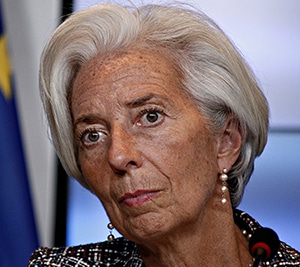The prospect of a “wild card” leading the European Central Bank is a striking development in the ongoing shift in monetary policy being wrought by Western central banks.

When European Union heads of state announced this summer that Christine Lagarde, head of the IMF (she has since resigned from that Washington-based post), was their candidate to replace Mario Draghi, who has been at the helm of the ECB since 2011, many pundits initially scratched their heads.
Lagarde’s name didn’t even feature on lists of likely candidates for the top job, which largely included existing EU central bank heads from member states like Germany, France and the Netherlands.
“Lagarde was definitely a wild card for the ECB presidency,” says Alastair George, chief investment strategist at Edison Investment Research. “She came late to the stage, almost overnight, then suddenly everyone was in agreement that she was the right candidate to put forward.”
Most top central bankers have backgrounds in economics, either professional or academic; Lagarde trained as a lawyer. But what she lacks in economic credentials, she more than makes up for in political clout and connections. Lagarde was the first woman to become a minister of Finance and the Economy in a G7 country as part of Nicolas Sarkozy’s government in France. In Forbes’ World’s 100 Most Powerful Women 2018, she was ranked the third most-powerful woman, behind Theresa May and Angela Merkel in the No. 1 position.
“In her role at the IMF, she was also involved in the Greek bailouts, so she understands the challenges in EU member states,” says George. “Draghi did not manage to persuade EU governments in terms of providing fiscal support for economic expansion. But given her political skills, Lagarde may enhance the role of fiscal policy to support economic expansion. She has as good a chance as anyone, given her connections and understanding of the political dynamics.”
George gives Draghi credit, however, for successfully bringing about quantitative easing when many in Germany believed it should be illegal. “He delivered negative interest rates and calmed the stresses on the periphery of Europe by providing monetary accommodation,” George says, adding that such successes make Draghi a hard act to follow in the monetary sphere.
Lagarde is set to take over from Draghi in November—which leads Markus Schomer, chief economist at global asset-management firm PineBridge Investments, to observe that two of the three major central banks (the US Federal Reserve, the Bank of England and the ECB) will be run by lawyers. Current US Fed Chairman Jerome Powell, also a lawyer, succeeded Janet Yellen in February 2018 as head of the Fed. “In a world of unconventional monetary policy,” Schomer explains, “politicians are starting to recognize central banks as useful enablers of fiscal policy [through debt monetization], which has created an environment where political pressures on central banks are increasing.”
It is too early to say how Lagarde will govern, but Schomer says we can look at how she operated at the IMF. He points specifically to the Greek debt crisis, which she sought to relieve Greece of its debt burden. “She has a short-term horizon and goes for the most obvious solution,” Schomer says. “So, if inflation is too low, her response will probably be to print more money, but that can have long-term ramifications, such as negative bond yields.”
With uncertainty looming over economic growth and market confidence in the EU and the next ECB president having to mop up after a possible “no-deal” Brexit, one wouldn’t envy her job in the first few months, says George: “With two negative factors occurring at the same time, if the slowdown does turn into a full-blown recession, it will be a challenging time for her and require some measured political handling.”



